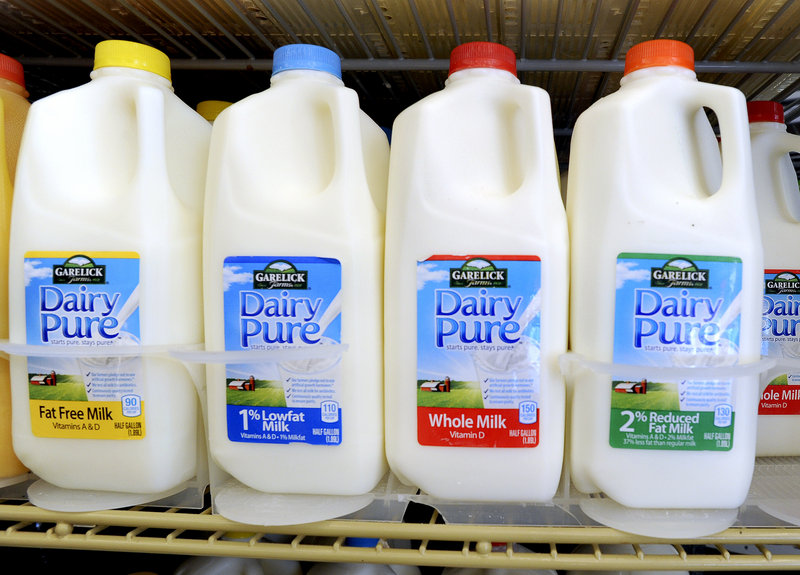The recent closing of Garelick Farms in Bangor is having an impact beyond the loss of the dairy processor’s 35 jobs.
It also means higher costs for Maine’s 307 dairy farmers, on top of high feed and fuel prices.
Dairy farmers now must strike deals to process their milk at small dairies or one of Maine’s two remaining large dairies — Oakhurst or Hood.
Their only alternative is to pay high fuel costs to truck their unprocessed milk to plants out of state.
The farmers will take another hit because Garelick’s closing reduces the amount of money going into the Maine Milk Pool, a fund to subsidize struggling dairy farmers and ensure that milk produced in Maine is processed and sold in the state.
Maine-based dairies pay into the pool for all the milk they buy from Maine farmers, process in-state and sell to Maine consumers. The payments are based on a formula that takes into account federal minimum milk prices, producers’ margins and other factors.
The pool seeks to cover some of the difference between the cost of producing milk and the price the farmers receive.
Tim Drake, an official with the Maine Milk Commission, said the fund takes in about $300,000 a month from the dairies, which is distributed to farmers based on how much milk they produce. The average dairy farmer receives about $1,000 a month, he said.
Garelick Farms, which was closed in mid-December by its parent company, Dean Foods, was contributing about $50,000 a month to the pool, Drake said.
That means the fund will shrink by about $600,000 this year, with a loss of about $2,000 in payouts for the average farm.
“This is just one more thing” farmers must deal with, said Dale Cole, who runs Cole Farms in Sidney and is president of the Maine Dairy Industry Association. “The consumers in the state of Maine are paying for the product, but it’s not coming back to the farms. It’s a terrible thing.”
The federal government sets a minimum price for milk. The program began during the New Deal to ensure that farmers got fair prices for their product and didn’t have to take low offers from dairies for their highly perishable product.
The minimum covers most of the country, but not Maine. Cole said the federal minimum does essentially set the market price for milk in Maine, and that price isn’t enough now for Maine farmers, who have seen feed and fuel prices spike in the past year.
“We need a new system, otherwise we’re not going to have Maine milk,” he said.
The shrinking pool alone is unlikely to drive any dairy farmers out of business, but it will put them deeper in a financial hole, said Julie-Marie Bickford, executive director of the Maine Dairy Industry Association.
Bickford called it “a multi-layered hit,” with rising production costs and a reduction in income.
The impact is likely to be felt beyond dairy farms, she said, because farmers hire local workers, buy feed from local suppliers and get their tractors repaired by local dealers.
“We not only have a concern for the farmers, we have a concern for these other businesses as well,” she said, noting that the dairy industry has an economic impact of $570 million in the state.
The state’s largest dairy is highlighting the shrinking pool to raise consumers’ awareness of the issue — and create a marketing edge.
Oakhurst Dairy said it’s starting a “Keep Your Milk in Maine” campaign and encouraging consumers to look for the Maine quality label to make sure they’re buying Maine-produced and processed milk that will help boost the milk pool.
Bickford said Maine dairy farmers will probably need more help than a public relations campaign might provide. She said the state’s milk pool is a safety net to help struggling dairy farmers.
But that safety net is beginning to fray, she said, and “any additional loss just exacerbates the strain.”
“The farmers are upside down right now,” she said, and for some, even a modest loss of income from the milk pool could make the difference between staying in business and selling the family farm.
“Dairy farmers aren’t looking to get rich,” she said. “This isn’t padding anybody’s retirement account.”
Edward D. Murphy can be contacted at 791-6465 or at:
emurphy@pressherald.com
Send questions/comments to the editors.




Success. Please wait for the page to reload. If the page does not reload within 5 seconds, please refresh the page.
Enter your email and password to access comments.
Hi, to comment on stories you must . This profile is in addition to your subscription and website login.
Already have a commenting profile? .
Invalid username/password.
Please check your email to confirm and complete your registration.
Only subscribers are eligible to post comments. Please subscribe or login first for digital access. Here’s why.
Use the form below to reset your password. When you've submitted your account email, we will send an email with a reset code.